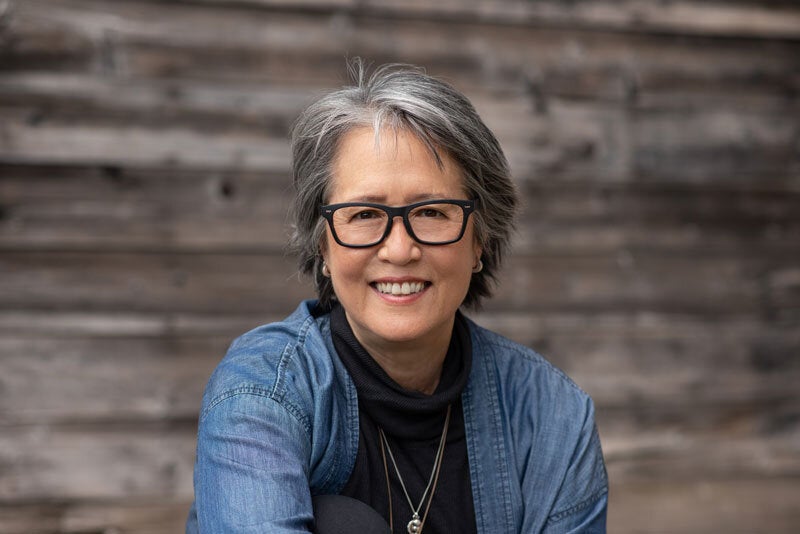KINGSTON, R.I.—April 4, 2024—The University of Rhode Island Center for the Humanities will host “A Conversation with Novelist Ruth Ozeki,” the final event in its “Innovations in Storytelling” series, Thursday, April 11, at 4 p.m. in the Higgins Welcome Center, 45 Upper College Road. The event, which is free and open to the public, is part of the Center’s annual Spring Humanities Festival and will be available via livestream. To register, visit the lecture’s webpage.
This year’s Spring Humanities Festival marks the 30th anniversary of URI’s Center for the Humanities. To recognize this milestone, the Center chose the theme “Innovations in Storytelling,” bringing together historians and novelists, cartoonists and artists, musicians and musicologists, anthropologists and quilters to discuss the craft of storytelling – an endeavor at the heart of the humanities – as the topic of its annual speaker series.
A celebrated novelist and filmmaker—as well as a Zen Buddhist priest—Ozeki is a frequent speaker on college and university campuses. Ozeki is a professor emerita of English Language & Literature at Smith College, where she was also the Grace Jarcho Ross 1933 Professor of Humanities. She is known for her ability to integrate issues of science, technology, religion, environmental politics, and global pop culture into unique, hybrid, narrative forms.
Her most recent novel, The Book of Form and Emptiness, published by Viking, tells the story of a young boy who, after the death of his father, starts to hear voices and finds solace in the companionship of his very own book. Drawing partially on her own experience following the loss of her own father in 1998, the novel has been characterized as “inventive, vivid and propelled by a sense of wonder” by Time Magazine and was the winner of the 2022 Women’s Prize for Fiction as well as the 22nd Annual Massachusetts Book Award, the BC Yukon Book Prize, and the Julia Ward Howe Prize for Fiction.
“We are so excited to welcome Ruth Ozeki as our final speaker for the ‘Innovations in Storytelling’ lecture series,” said Evelyn Sterne, URI associate professor of history and director of the Center for the Humanities. “She takes such a unique approach to storytelling and her latest novel is really about the power of books, not only to tell stories, but also to heal and connect people—so we thought this would be a perfect way to end the series.”
In her talk, Ozeki will discuss her work and the innovative ways in which she tells stories.
Ozeki was raised in New Haven, Connecticut, and attended Smith College, where she graduated with degrees in English literature and Asian studies. Following her time as an undergraduate at Smith, Ozeki spent several years in Japan pursuing graduate work in classical Japanese literature at Nara Women’s University and later taught on the faculty at Kyoto Sangyo University.
Ozeki began her film career in 1985 in New York as an art director for low budget horror movies, before eventually transitioning to television production and directing documentaries for Japanese TV. In 1994, she started making her own films. Her documentary and dramatic independent films, including Halving the Bones, have been shown on PBS, at the Sundance Film Festival, and at colleges and universities across the country.
Ozeki’s novels, My Year of Meats (1998), All Over Creation (2003), A Tale for the Time Being (2013) and The Book of Form and Emptiness (2022) have been translated and published in over 30 countries. Her third novel, A Tale for the Time Being, won the Los Angeles Times Book Prize, and was shortlisted for the Man Booker Prize and the National Book Critics Circle Award. Her work of personal non-fiction, The Face: A Time Code (2016), was published by Restless Books as part of their groundbreaking series The Face.
As part of the festival, Dean of Arts and Sciences Jeannette Riley will also recognize three students whom the Center for the Humanities has chosen to receive Student Humanities Excellence Awards. The awards are given annually to students who have made strong contributions to the humanities at URI and show promise in a humanities-related career. This year’s undergraduate winners are Frost Infante, who is majoring in art history, English, history and languages, and Taylor Moss, who received her Bachelor of Arts degree in art history in December. The graduate winner is Aidan Barlow-Diemer, who expects to receive her Master of Arts degree in history this May.
Ozeki will also be available for a book signing following her talk. In preparation for her visit to URI, the College of Arts and Sciences has made 100 copies of The Book of Form and Emptiness available for a community-wide Big Read. Anyone who would like to receive a free copy of the book, should contact the Center for the Humanities. Copies not claimed by Thursday, April 11, will be distributed at the festival.

